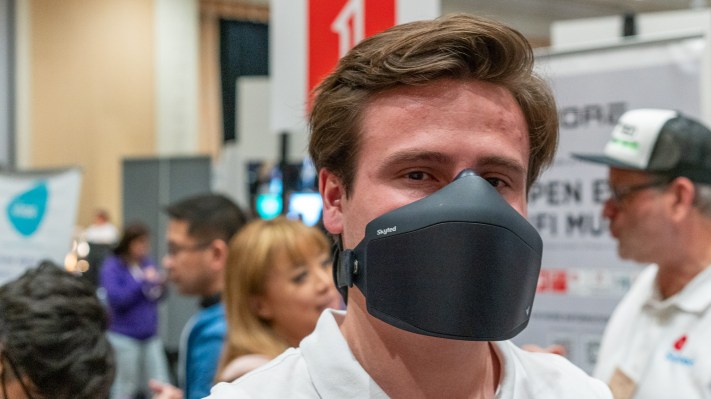
We previewed Skyted’s voice-capturing mask last week, but when I came across the startup at CES 2024, I had to check it out for myself in person. You can read all about the tech in our previous article, but what is it actually like in person?
“We launched a mobile application that will give you information about how big your ‘sound bubble’ is. If, for example, you’re sitting in an airplane, you don’t want the person next to you to hear what you’re saying,” says Gauthier Daridon, connectivity engineer at Skyted, in an interview with TechCrunch at CES in Las Vegas. “So our application will explain that you are ‘perceptible’ and ‘intelligible’ at certain distances.”
Daridon demonstrated the mask and talked in a normal voice. Through a set of headphones, I was able to hear him relatively clearly. Without the headphones, I could hear a slight mumbling – I was standing around 3 feet away – but I wasn’t able to discern the individual words. At a couple of steps away, the mumbling disappeared into the general hubbub of the noisy show floor.

Gauthier Daridon holds up a prototype of the mask to his face. Image credit: TechCrunch / Haje Kamps
The company was founded in 2021, currently has around 20 staff, and raised $1 million of funding; about half from angels and other smaller investors, and the other half from the French government. This week, the company launched a Kickstarter campaign, which has, so far, sold just short of 300 masks for a total of around $64k worth of pledges.
Personally, I’m still a little puzzled for the use cases for this device, and I’m struggling to think of that many situations where you absolutely have to talk, where you can’t be overheard, and where wearing something like this would be socially acceptable. The team has some ideas:
“We’re looking at various customer segments; mostly businesses, open spaces, like offices where this would be a huge. In places like call centers, this would be a huge business. We also looking at B2C, for use cases such as gaming,” explains Daridon. “Special Forces came to us because they wanted us to design a mask for them so that they don’t they can be completely quiet for events where voice cannot be emitted.”
So far, it seems to be a solution in search of a problem – but that’s one of the exciting things about cutting-edge tech: occasionally, you have no idea where the opportunities lie, and you have to plod through a Kickstarter campaign to figure it out. I look forward to keeping an eye on the company and its products as it works towards shipping the first batch of products by the end of this year.
